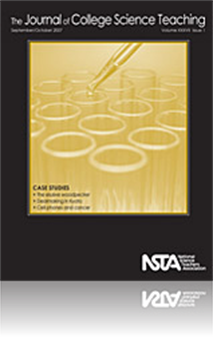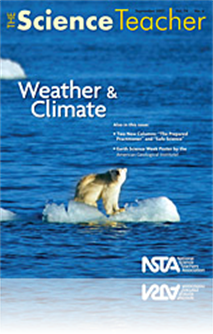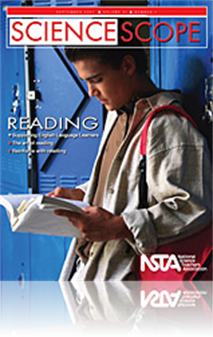All Resources
Journal Article
A message from the NSTA President: Meeting the Needs of the New World Student
To succeed in the 21st century, students have to learn how to be creative problem solvers who can work in collaborative groups. These new-world students must have the ability to think critically, use technology efficiently, and communicate effectivel...
Journal Article
Career of the Month: An interview with Aquatic Conservation Biologist Zeb Hogan
To protect the diversity of life on Earth, conservation biologists study species and habitats in danger of extinction. Freshwater is arguably one of the most critical global resources. The ecosystem biodiversity of this invaluable resource is highly ...
Journal Article
The Case of the Ivory-Billed Woodpecker: The Scientific Process and How it Relates to Everyday Life
In this case study, based on the reported rediscovery of the Ivory-billed Woodpecker in April 2005, students examine a real-world example of the scientific process and explore the practical implications of their conclusions. The case tells the story...
Journal Article
“May I go to the bathroom?” While this hardly an unusual question from any middle-level student, the number of students who suddenly need to leave the room increases when a teacher assigns a textbook passage to read. Whether it is to use the rest...
Journal Article
The Art of a Deal: A Kyoto Protocol Simulation
In this case study, groups of students represent countries as they negotiate an agreement to limit greenhouse-gas emissions. While initially developed for and used in an environmental-science course for first-year college students, the case could be ...
Journal Article
Research shows that many students hold misconceptions related to plant functions (Hershey 2004). Some of these students will become teachers with little content understanding to identify their students’ misconceptions about plants (Amir and Tamir 1...
Journal Article
To circumvent the problem of academic dishonesty through the mass administration of multiple-choice exams in college classrooms, a study was conducted from 2003 to 2005, in which multiple versions of the same examination were color coded during testi...
Journal Article
Ask the Experts—September 2007
In this month’s column, the experts address the following question: Why do mosquitoes ignore me, while they devour my brother-in-law! ...
Journal Article
Safe Science: Laboratory Safety: Welcome Aboard!
Why has The Science Teacher initiated a new safety column? Walk into a typical science classroom today and you are likely to see the teacher conducting a demonstration or students doing hands-on laboratory work. This key instructional strategy has ...
Journal Article
Erupting with Great Force: Performing Text to Enhance Reading Comprehension
Performing text in the form of choral reading, rap, reader’s theatre, and/or simulations offers students a powerful vehicle for understanding and recalling key concepts and significant details culled from textual materials. Creating a script, poem,...
Journal Article
The Prepared Practitioner: Defining Science
In a recent Phi Delta Kappan article, Perry Zirkel (2007) described professors and superintendents as “… two groups … marching to the beat of different drummers.” The point is just as valid for professors and teachers. He went on to say, �...
Journal Article
Tools of Engagement: Using Case Studies in Synchronous Distance-Learning Environments
Faced with the challenges of addressing a variety of student learning styles, academic levels, and demographics, incorporating innovative learning strategies, attaining higher-level thinking skills, and offering new courses with contemporary content,...
Journal Article
Idea Bank: Clarifying Tropical Cyclone Activity in Centuries Past
In order to truly answer questions of hurricane frequency one must move past short-term human-documented meteorological records and find environmental proxies for determining historical hurricanes. Just recently, Miller et al. (2006) established such...
Journal Article
Cell-Phone Use and Cancer: A Case Study Exploring the Scientific Method
Designed for an introductory nonmajors biology course, this case study presents students with a series of short news stories describing a scientific study of cell-phone use and its health effects. Students read the news stories and then the scientifi...
Journal Article
President’s Message: Meeting the Needs of the New World Student
To succeed in the 21st century, students have to learn how to be creative problem solvers who can work in collaborative groups. These new-world students must have the ability to think critically, use technology efficiently, and communicate effectivel...
Journal Article
Feel the Pulse of Earth Science!
Each year, the American Geological Institute (AGI) organizes Earth Science Week to help monitor and spread Earth science literacy. This year marks the 10th annual Earth Science Week, which is geared to promote better understanding of the geosciences ...
Journal Article
Reading Into Science: Making It Meaningful
Helping students read science textbooks and other substantive material does not have to interrupt the flow of content delivery. A variety of strategies, both instructive and effective, are available to help students become more competent and independ...
Journal Article
Through retelling, students can begin to attach sense and meaning to the sometimes complex concepts they encounter in science texts. Also, the shift from silent thinking to verbal expression causes the brain to consolidate and integrate new ideas. As...
Journal Article
Science Shorts: Making a Case for Camouflage
What child doesn’t enjoy a good game of hide-and-seek? There is the challenge of finding the perfect hiding spot and, of course, the allure of the hunt. Though children get great pleasure from the game, many members of the animal kingdom are the re...
Journal Article
A message from the NSTA President: Meeting the Needs of the New World Student (September 2007)
To succeed in the 21st century, students have to learn how to be creative problem solvers who can work in collaborative groups. These new-world students must have the ability to think critically, use technology efficiently, and communicate effectivel...
Journal Article
Scope on Safety: Bloodborne pathogens—Be prepared, be protected
Malaria, Lyme disease, Epstein-Barr syndrome, meningitis, syphilis, hepatitis B and HIV/AIDS—what do all of these diseases have in common? These belong to a group of over 100 microorganisms categorized as bloodborne pathogens. With the HIV epidem...
Journal Article
Guest Editorial: Happy anniversary, traveling companion!
Fifty years ago, on Friday, October 4, 1957, a 184-pound, silver-colored, metal ball caused an event that would change the world forever and reshape science education in the United States for decades to come. That beach ball-sized object was the man-...
Journal Article
Editor’s Roundtable: Share your passion for science
We are not only teachers of science content, processes, and attitudes, but also teachers of writing and reading. The articles in this month’s issue of Science Scope contain numerous strategies to improve student achievement and understanding in s...
Journal Article
Methods and Strategies: Teaching About Animals
When asking about animals, it is hard to find a person who doesn’t recall a beloved pet or share that they’ve always loved dolphins, snakes, or ladybugs. A study of animals in an early childhood classroom, then, would seem an easy entry into scie...
Journal Article
The projection screen in the dimly lit auditorium was ready and an online chat window was open on the computer screen. Computer experts and entomologists were ready on the other end. One by one, students filled up the rows of seats eagerly anticipati...
Journal Article
What invertebrates make the best classroom pets? How should we care for each invertebrate? What type of inquiry activities could invertebrates support? How do elementary students respond to invertebrates? These were the questions investigated in The ...






